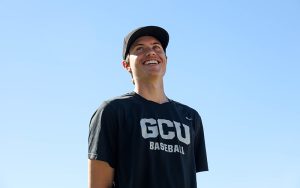PHOENIX – During two weeks in the summer as a high school pitcher, Carter Young was a baseball vagabond. He traveled from Denver to Las Vegas to Denver again, then Indianapolis to Denver to Casper, Wyoming.
While this sounds like a nice vacation for some, the Grand Canyon sophomore right-hander was doing what was necessary in order to gain recognition for his baseball talents. The 2021 second-team All-WAC selection grew up in Wyoming, one of only two states that does not offer high school baseball as a sanctioned sport, and unlike the other, South Dakota, offers limited opportunities for young players.
Young will be on the mound this weekend as GCU opens its season at home today with a three-game series against Nevada.
Young grew up around two older brothers, both of whom played baseball. As young as 3 years old, he traveled to his older brothers’ baseball tournaments. He fell in love with the sport.
“I just kept playing ever since,” he said.
Young’s first baseball tournament appearance was by accident. While attending his older brother’s baseball game, an injury to a teammate left a vacancy on the field. After gaining the coaches permission, Young, 6, took the diamond for the first time.
Two years later, he began playing competitive baseball. Living in a state with limited baseball resources, Young had to travel – and travel often – to pursue the sport he loves.
Baseball has never been a sanction sport in Wyoming, a combination of cold spring weather and small school enrollment.
The Wyoming native’s closest game site was an hour-and-a-half drive from his hometown, demanding plenty of out-of-state travel. Accompanying Carter in these conquests were his parents, Robert and Sandy Young.
During Carter’s youth, Sandy estimates the Youngs would travel to Colorado around eight times every summer.

By the time he had finished high school, Young had played baseball in over 10 states, spanning all four time zones. (Photo by Susan Wong/Cronkite News)
“When he was younger, and they played on a travel ball team, they would (usually) go and play in Colorado,” Sandy said. “That would be a four hour drive on either a Friday afternoon if they had a game Friday night, or really early Saturday morning. They would play, and then hopefully we would get home really late (around) 10-12 o’clock Sunday night. If we got home really late, that meant (Carter’s team) played really well.”
Fast-forward to high school, and Carter was unable to letter in the sport he loved. To get in front of college coaches, the traveling continued. By the time it was all said and done, Carter had played baseball in over 10 states, easily spanning across all four time zones in the contiguous United States.
“My junior summer, I was only home for five or six days out of the whole summer,” he said.
Robert knew that his son ”wanted to play college baseball, and that’s the only way we could do it. I didn’t know any other way to get him seen or get him against the best competition in the country.”
As a result, Carter remains grateful to his parents and to a father that would “drive a Saturday trip down to Denver and back. A good eight hour drive just to help me pursue baseball.”
All the hours, miles and trips to the gas station eventually paid off. At an Area Code Baseball tryout, Carter pitched to only five batters per the rules. When he was done, Carter was officially on GCU’s radar.
A couple of weeks later, Carter played in a Perfect Game tournament in Phoenix, where GCU watched him pitch again. After the tournament, GCU invited Carter to the university to meet coaches and view the campus.
Even with the extended traveling, Carter wasn’t scouted extensively by the Lopes.
“With Carter, we just had to trust our gut a lot more than with other kids because we didn’t have any people we could reach out to about his performance,” said GCU baseball recruiting coordinator and assistant coach Gregg Wallis. “We didn’t have any networks of people that have seen him. We just had to trust our eyes.”
The eyes of the Lopes coaching staff paid off, as Carter’s freshman campaign yielded a 2.77 ERA, good for 73rd in the nation, and included a 10 strikeout game against Seattle in March. Now a sophomore, Carter plays an integral part on a team coming off a WAC championship, its first in program history.
“From day one as a freshman, no moments (are) too big,” Wallis said.
A long – and rewarding – road will do that to a player.


